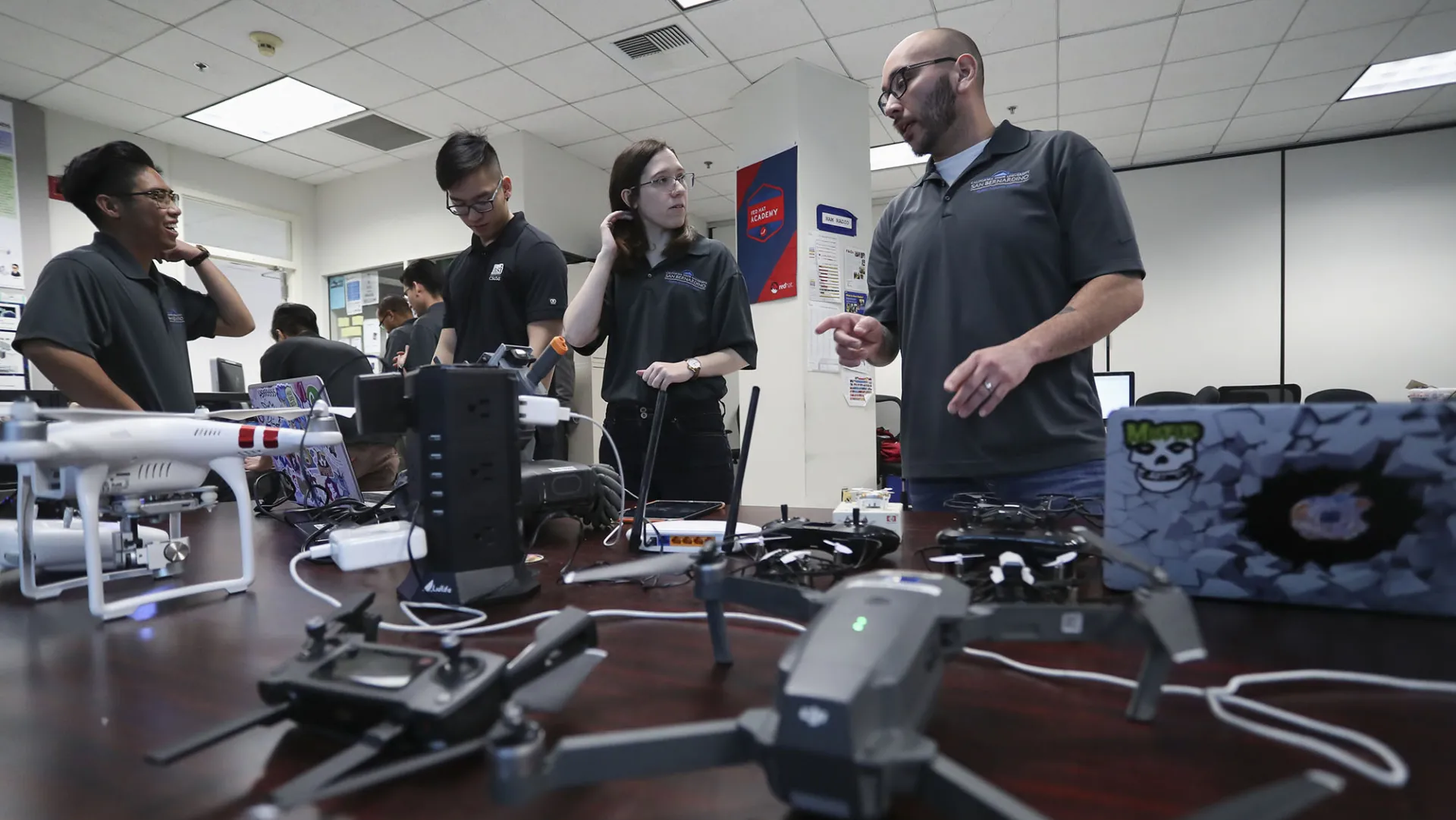Joe Gutierrez | Office of Strategic Communication | (909) 537-3007 | joeg@csusb.edu


Recognizing economic competitiveness and security depends on advanced cyberinfrastructure to enable science and engineering research and education, the National Science Foundation (NSF) initiated a CyberTraining funding challenge to prepare and develop a workforce that can help scientists meet their computational needs.
Accepting the NSF challenge, an interdisciplinary team of cyberinfrastructure (CI) experts led by California State University, San Bernardino, the San Diego Supercomputer Center (SDSC) at UC San Diego and San Diego State University (SDSU) have been awarded $6.7 million for training and mentoring a cohort of CI professionals. Referred to as CIPs, they will navigate the CI landscape, apply CI tools and work hand-in-hand with scientists to meet their computational, visualization and data analysis needs.
This new interdisciplinary training program focuses on four main areas: recruitment and training, Science and Engineering (S&E) project matching and mentoring, S&E research consulting, and fostering and participating in interdisciplinary CIP communities.
“Our training program recruitment goals are that the cohort will be drawn from populations including domain scientists, interdisciplinary research professionals, faculty, students and other NSF workforce individuals and underrepresented STEM communities,” said Mary Thomas, principal investigator (PI) for the interdisciplinary training program and computational data scientist and lead of high-performance computing training at SDSC. “Interdisciplinary cyberinfrastructure professionals will be embedded deeply within departments, projects and programs at the institutions involved in our program.”
According to co-PI Robert Sinkovits, who directs Education and Training at SDSC, the program optimizes resources and promotes sustainability by allowing for resources not in use by more advanced trainees to be instead utilized by new interdisciplinary CIP trainees. “A strength of the interdisciplinary training program is its potential for expansion to produce more than four funded interdisciplinary cyberinfrastructure professionals after five years, which will broaden its impact,” he said.
Thomas explained that after analyzing different funding models ranging from hiring four CIPs for five years, to partially funding the interdisciplinary CIPS and bringing in new cohorts, the collaborators developed a funding model that aims for a “sweet spot” in which current trainees have the time needed to develop expertise while new trainees enter the program.
“Thus, trainees will transition over time from being primarily trainees to being integral members of the institutions where they are funded, and where they can assume other diverse responsibilities that complement their responsibilities,” said Thomas. “For example, the program provides critical resources to SDSU and CSUSB to strengthen and expand a more active and interdisciplinary campus community of practice for cyberinfrastructure.”
SDSU’s activities will be focused on hiring an interdisciplinary research professional, creating a faculty CI Fellows program and amplifying the reach of these efforts by targeting faculty and staff with CIP training offered through the partnership with SDSC.
“The new interdisciplinary training program is a tremendous transformative investment by NSF in the faculty and students at San Diego State University. The grant allows us to hire a new dedicated CI professional and to create a new faculty fellows program,” said Jerry Sheehan, SDSU vice president for Information Technology and chief information officer. “These investments will allow us to evolve our use of national resources for scientific discovery as we continue our path towards becoming a research-intensive R1 Hispanic-Serving Institution.”
CSUSB will also hire interdisciplinary research professionals, extend its existing faculty CI Fellows program and leverage the Extended REALity for Learning (xREAL) Lab to reach a diverse group of faculty, staff and students.
“This grant will allow CSUSB to scale and expand its research computing infrastructure to foster and support faculty-led innovation and research at our university,” said Samuel Sudhakar, vice president of CSUSB’s Information Technology Services and chief information officer.
Other co-PIs — Andreas Goetz and Paul Rodriguez (SDSC) and Rick Wagner (UC San Diego) — will work with Thomas and Sinkovits to integrate the interdisciplinary training program into ongoing and long-term, high-performance computing/CI training programs and research projects and encourage cyberinfrastructure professionals to become CI trainers. An independent program evaluation will be conducted for the training program by Monica Sweet, co-director of research and evaluation at UC San Diego’s Center for Research on Educational Equity, Assessment and Teaching Excellence (CREATE).
According to Thomas, each of the participating institutions is committed to ongoing support for training and sustainable CIP career paths at the individual campus communities. Importantly, there is interest in exploring a CSU-wide Advanced CI Computing Collaboration with this effort serving as the seed project for such an initiative.
“The benefits of our approach include embedding trainees in a real-world production environment that accelerates learning about how the job and the institution work,” noted Thomas. “The work will help reveal areas where additional training is needed, and creation of these new positions will incentivize the institutions to identify funding to support these interdisciplinary training program cyberinfrastructure professionals, enabling us to train a larger cohort.”
Additionally, the program is committed to supporting the NSF ACCESS program by facilitating the efforts of CIP trainees to work on science research efforts, identified by the Support Track under MATCH Research Support, through their Computational Science Support Network (CSSN).